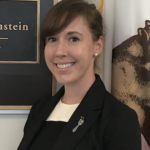I got involved in advocacy out of exasperation. Like other rheumatologists, I often see patients who face challenges accessing medications due to cost or delays from the administrative burdens of trying to appeal medication denials. I channeled these frustrations into the desire to do something about it and found advocacy as a means to impact change.

Dr. Brittan
I have been fortunate over the past year to volunteer as the fellow-in-training member of the ACR’s Government Affairs Committee (GAC). Prior to this role, I had experience in advocacy on a local level: first through serving on the Board of the Nebraska Medical Association and providing testimony at the state capitol, then through serving on the Board of the Nebraska Rheumatology Society. I was excited for the opportunity that the GAC provided to expand my advocacy experience to a national stage.
I can say that I’ve gotten much more out of my year on GAC than I’ve put in. On a personal level, I found a sense of satisfaction and empowerment by having a voice through advocacy. I have developed closer relationships with patients who appreciate my efforts to help them with access to care. Professionally, it was a great way to meet and collaborate with experts from around the country and to acquire new leadership skills.
While serving on the GAC, I was able to see all the behind-the-scenes work that the government affairs staff and GAC members do to get our voices heard. I learned about the issues and how to get key messages across to legislators. Through our virtual Hill Days, I found that most medical decision makers have limited medical knowledge but often want to learn about healthcare issues from someone other than a professional lobbyist. It was reassuring that I was not expected to be a policy expert; instead, conversations resonated more when communicating how policies impacted the ability to care for my patients in clinic. This experience showed me just how important advocacy is for my patients, my practice and rheumatology as a specialty.
When it comes to advocating for rheumatology, it’s never too early or late in your career to begin. Advocating for patients and for the profession doesn’t have to be time intensive. There are a variety of ways to get involved, ranging from volunteering on a committee to dipping your toes in with Advocacy 101 and the ACR’s Advocates for Arthritis fly-in. You don’t have to have any prior experience; Advocacy 101 is a program that brings members to Capitol Hill for a day of learning about health policy and a day of advocating. One of the most effective ways to be involved is also the quickest: Email or call your representatives about a specific bill or issue. You can even utilize and personalize pre-drafted letters through the ACR’s Legislative Action Center, which has contact information for Congressional and state representatives nationwide.
I hope that you will consider getting involved with advocacy. Whether in big or small ways, it will help your patients, your profession and your satisfaction and help make meaningful change.
Editor’s note: The ACR’s Member volunteers govern the organization, are the driving force behind the development of educational programming, publications and guidelines, and shape ACR positions on both state and federal legislation. Explore volunteer opportunities today. Nominations for the ACR and Foundation Board of Directors and Standing Committees are open until June 1.
Kaitlyn Brittan, MD, is an assistant professor in the rheumatology division at the University of Nebraska Medical Center in Omaha and a member of the Government Affairs Committee.


